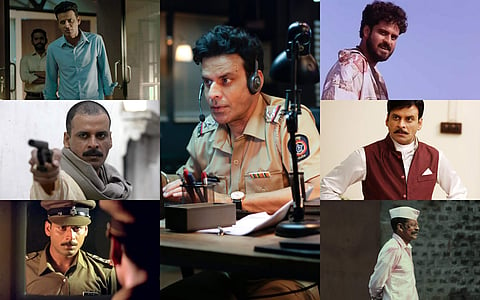

In a career sprawling 27 years, Manoj Bajpayee has essayed iconic characters—from his breakout performance as the violent yet humane gangster, Bhiku Mhatre in Ram Gopal Varma’s Satya, to the murderous Sardar Khan from Gangs of Wasseypur, to the intelligence officer, Srikant Tiwari, who grapples with national security threats and familial conflicts in The Family Man. The actor has donned the khaki in a handful of films—including Shool, in which he played an aggressive, yet vulnerable inspector, and Satyamev Jayate, in which he played the gloriously dramatic Shivansh Rathod—and always succeeded in creating a humane impression. In fact, it was his performance as a retired cop—as the reticent, weary constable Ganpath Bhonsle in Devashish Makhija’s wonderful film, Bhonsle—that fetched him his second National Award for acting.
My personal favourite, however, remains DCP Aravind from the 2006 Telugu film, Happy. Aravind was stern and furious, yet the joke was always on him. “All my experiences with Telugu cinema have been wonderful,” says Manoj. “Allu Aravind (the father of Allu Arjun), the producer of my Hindi film, Kaun, convinced me to be a part of Happy after the director (Karunakaran) wanted me to play the part. I have great memories of my Telugu projects like Prema Katha, Vedam, and Puli (2010). It’s quite a task to learn the Telugu dialogues though,” he says, laughing.
Now, the actor once again plays a cop in his upcoming film, Dial 100. “I play characters, not the uniform they wear. It’s never about the profession; it’s always about the person I play. This is why every performance is different” he says. “My character from Dial 100 is a man from the middle class. He’s a failed father and husband. When life gives him an opportunity to redeem himself, can he rise to the challenge? What is at stake? These are the questions that drive him. This thriller is quite topical in many ways.”
The challenge, says Manoj, is to ensure that contemporary roles aren’t seen as passing through the shadow of previously acclaimed performances, and so, eschewing monotony is his primary intent. “When people have seen so much of you, how do you stay different?” he asks, rhetorically. The hack to evoke uniqueness in every role is “to concentrate on the character and the story, completely shunning your past. It is how people will see something new from you. If my past distracts me, I’ll end up doing something similar. It’s better to get into every role as a newcomer, like each film were your first and last. That has worked out for me.” The actor goes on to draw parallels between life and acting: “I’m experiencing life every day, and my response to life is as fresh as it used to be earlier. Why shouldn’t my characters be as fresh?”
Manoj debuted in 1994 with Shekar Kapoor’s Bandit Queen, appearing in a minor character named Man Singh, which is incidentally the name of his character in the acclaimed 2019 film, Sonchiriya. After all these years, do scripts still manage to surprise him? “Definitely. The world is changing every day. The current generation of filmmakers grew up watching a different kind of cinema. They sit in contrast to our generation on every level—exposure, belief, conviction, vision, interpretation, and storytelling. Characters they write are all the more exciting and peculiar now,” says Manoj, who finds motivation in innovative storytelling. “Novelty excites me every day. It is why I juggle between genres. I want to keep challenging myself; I want to be on my toes, and not get complacent. Many new writers and filmmakers are the same,” says Manoj.
Manoj has never restricted himself to a particular ‘kind’ of cinema either, having struck the balance between mainstream cinema and the ‘parallel movement’. He follows up a testosterone-high actioner like Satyameva Jayate with an intimate, true-to-life drama like Gali Guleiyan. This has always been a conscious decision, he says. “I grew up watching the films of Mr Amitabh Bachchan, Mr Vinod Khanna, and Mr Shatruguhan Sinha. I have always had great regard for Mr Bachchan for how he stepped into mainstream cinema, with loads of respect. I don’t like to judge scripts by genre either. In the pre-OTT era, mainstream cinema was the only medium to reach the masses and get recognised. I did it to empower myself, and I did it without any bias or condescension, and in turn, it has given me the strength to make independent films like Bhonsle and Gali Guleiyan,” says Manoj. He adds that the existence of independent cinema is crucial to preserve the essence of the medium. “I feel that cinema is an art form; it’s not just commerce. As an actor, I have to keep contributing to the medium. I act in independent films to feel complete and content. And I will keep doing it.”
The emergence of streaming services, indubitably, has given indie films a new lease of life by “blurring the line between films of different scales,” Manoj believes. “Independent films and middle-of-the-road films are doing exceptionally well on streaming platforms, whereas hardcore commercial films are struggling. It’s because the experience of community-viewing is different from an individual watching a film in solitude. OTT has a different scatter altogether,” shares the actor, whose The Family Man is one of the hottest streaming properties. “The biggest happiness The Family Man bestowed me is introducing me to a new section of the audience: children and teenagers. They are now exploring my previous works as well, which they couldn’t watch earlier for reasons like adult themes, violence, and ‘A’ certification. The Family Man helped many discover my body of work. Take, for instance, a film like Aligarh, which I wanted every age group to see as I feel it’s very educational. I feel extremely great that people are finally watching these films and appreciating them. I have a whole lot of respect for the new audience my work has generated.”